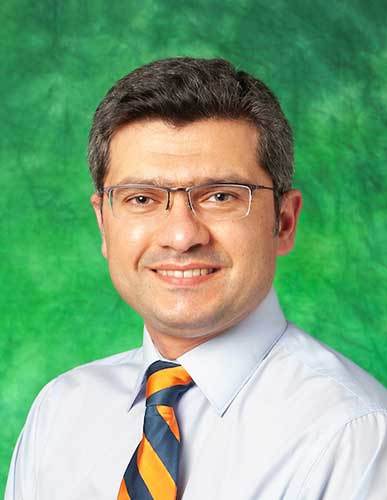Selcuk Acar
Faculty, Educational Psychology
Professor
Matthews Hall 316

Selcuk Acar, Ph.D., is a Professor of Educational Psychology at the University of
North Texas. He earned his Ph.D. in Educational Psychology, with an emphasis in Gifted
and Creative Education, from the University of Georgia. His research centers on divergent
thinking, creativity assessment, and the education of gifted and talented students.
Prior to joining UNT, he worked at the Torrance Center for Creativity and Talent Development
at the University of Georgia and the Center for Applied Imagination at SUNY Buffalo
State. Dr. Acar has authored numerous book chapters and encyclopedia entries and has
published more than 85 peer-reviewed articles, primarily in creativity research. He
previously served as Principal Investigator on a creativity measurement grant funded
by the Institute of Education Sciences to develop a new measure of original thinking
(MOTES). He is currently co-leading a National Science Foundation–funded project focused
on human–AI collaboration for creativity development. He serves as Co-Editor of Psychology
of Aesthetics, Creativity, and the Arts and serves on the editorial boards of Gifted
Child Quarterly, Journal of Creative Behavior, Journal of Advanced Academics, and
Creativity Research Journal. Dr. Acar is the recipient of the American Psychological
Association Division 10 2022 Berlyne Award for outstanding research by an early-career
scholar and the University of Georgia’s 2026 Alumni Award in the Mid-Career Researcher
category.
- Acar, S., Lee, L.E., &Scherer, R. (2024). A reliability generalization of the Torrance Tests of Creative Thinking-Figural. European Journal of Psychological Assessment. Advance online publication. https://doi.org/10.1027/1015-5759/a000819
- Acar, S., Dumas, D., Organisciak, P., &Berthiaume, K. (2024). Measuring original thinking in elementary school: Development and validation of a computational psychometric approach. Journal of Educational Psychology. Advance online publication. https://dx.doi.org/10.1037/edu0000844
- Bower, J., Acar, S., Kursuncu, U. (2023). Measuring creativity in academic writing: An analysis of essays in Advanced Placement Language and Composition. Journal of Advanced Academics, 34(3-4), 183-214. https://doi.org/10.1177/1932202X231211633
- Organisciak, P., Acar, S., Dumas, D., and Berthiaume, K. (2023). Beyond semantic distance: Automated scoring of divergent thinking greatly improves with large language models. Thinking Skills and Creativity, 49, 101356. https://doi.org/10.1016/j.tsc.2023.101356
- Acar, S. (2023). Does the task structure impact the fluency confound in divergent thinking? An investigation with TTCT-Figural. Creativity Research Journal, 35(1), 1-14.
- Acar, S., Tadik, H., Uysal, R., Myers, D., &Inetas, B. (2023). Creativity and socioeconomic status: A meta-analytic review. Journal of Creative Behavior, 57(1), 138-172. https://doi.org/10.1002/jocb.568
- Acar, S., Ogurlu, U., &Zorychta, A. (2023). Exploration of discriminant validity in divergent thinking tasks: A meta-analysis. Psychology of Aesthetics, Creativity and the Arts, 17(6), 705-724. https://doi.org/10.1037/aca0000469
- Acar, S., Branch, M. D., Burnett, C., &Cabra, J. (2021). Assessing the universality of the zero originality lists of the Torrance Tests of Creative Thinking (TTCT) - Figural: An examination with African American college students? Gifted Child Quarterly. Advance online publication. https://doi.org/10.1177/00169862211012964
- Acar, S., Neumayer, M., &Burnett, C. (2021) Social media use and creativity: Exploring the influences on ideational behavior and creative activity and accomplishment. Journal of Creative Behavior, 55(1), 39-52. https://doi.org/10.1002/jocb.432
- Acar, S., Tadik, H., van der Sman, C., Myers, D., &Uysal, R. (2020). Creativity and wellbeing: A meta-analytic review. The Journal of Creative Behavior. Advance online publication. http://dx.doi.org/10.1002/jocb.485